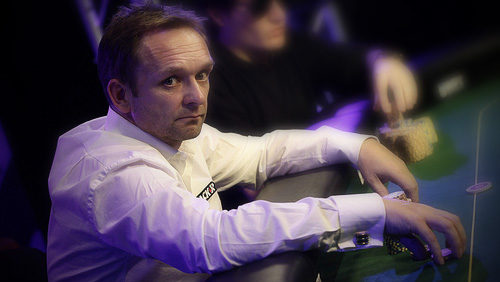Jeremy Nock is a Welshman living in Paris where he combines the three difficult tasks of playing poker, operating his businesses and trying to be a devote father and husband.
 Until recently poker was more of a hobby than anything too serious, but his appearance in the top 10 of the Global Poker Index (GPI) 2014 Player of the Year rankings might just change all of that.
Until recently poker was more of a hobby than anything too serious, but his appearance in the top 10 of the Global Poker Index (GPI) 2014 Player of the Year rankings might just change all of that.
Jeremy’s poker career is what I would call ‘in transition’ and this is why I have asked him to come on the show.
How are you feeling about your poker right now?
“In December 2012, I hit a string of three really good results. I nearly won the WPT main event in Mazagan where I came third, I came third in the France Poker Series (FPS) in Paris and took another third in an event held at the ACF in Paris. 2013 was different due to a heavy workload where I bought and sold a few hotels in Paris, then towards the end of 2013 I managed to win three seats for EPT Deauville and a seat at EPT Vienna. This year I have gotten back into the swing of playing live tournaments and things are going really well.”
What is life like trying to divide your time between your business interests and your poker?
“I am so glad that I have both. It’s important to split my time between my business interests and poker. I have 14 different businesses in the UK and France but my main business is the hotel industry. Sometimes my business gets complicated and I have to cut myself off from playing poker, whereas other times I will have the time to concentrate on poker. I also have two young daughters so I have to also find the time to be a father.”
How costly was it to break into the poker circuit?
“Initially, to learn poker correctly in 2007/08 I think it cost me between €10-20k to discover I was playing very badly. Then after a few million hands online you start to improve and your concentration starts to get a little better. Then in 2012 I moved into the live scene and being 45 I have more patience and a little bit of wisdom. It’s really funny – I often fold myself into ITM and final table positions, and that’s a key skill that some young people just don’t have. My biggest scores have come using this strategy.”
Before your scores your money must have been coming in through your businesses and out through poker. How did this affect your relationships?
“I look at it as an advantage because when you have other interests and an extra income outside of poker it helps you balance your poker costs. You can outweigh your expenses in poker by the money coming in through business and my wife Carol is very happy as long as the money is coming in.
“Most of my businesses are working well – some don’t – but luckily the hotel business in Paris is a very steady business to be in. There is much less seasonality in Paris and the ROI has been very constant over the past 20 years.”
How is the family holding up as you move further into poker with the more success you get?
“My wife {Caroline} wants me to keep the right balance between business, poker and family. You have to keep your feet on the ground. I’m not going to jet off to the LAPC like most pros will do because of the ties I have got. I am going for try and stick to the way I have been scheduling. It’s not easy but you have to work at it..”
And you have made it into the GPI 2014 POY Top 10.
“I have over 300 points now and I have noticed that Ole Schemion and Dan Smith have won it with around 1160 points. So I have 25% of these points after two months with another 10 months to go, so I’m going to keep on rolling and see how close I can get to the POY title.
“The POY is not decided over 2-3 results. A few years ago Dan Smith had three €5k wins in Monte Carlo which was outrageous, so if I don’t have any major final tables in the next few months then it’s going to be very difficult to compete against these pros who play so many events per year.”
If you did not have business interests, do you think you would have made it as a professional poker player?
“Definitely not because I have only had results this year, which is not enough to allow me to live to the standard I am accustomed to. You really need to have balance and other income to start out with, then if you get a bigger bankroll you can think of doing it differently.”
How is your game different today than just prior to that WPT final table in Mazagan back in 2012?
“I often have breaks of three to six weeks away from playing poker because of business. These breaks really help you because although you are not always playing – you are always thinking about poker. When you get back you find yourself in the same situation, with the same size stacks, with the same hands, looking at the same flops. You know what happened last time and so you can try things differently, and it’s these micro changes that really help your game develop.”